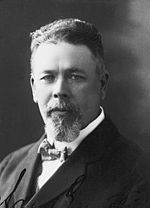About Adolf Engström
- Carl Adolf Engström (17 February 1855 – 19 June 1924) was a Finnish engineer, businessman and vuorineuvos. Engström got familiar already at early age with large machinery and engineering workshop environment due to his stepfather's work as engineer in the Finnish State Railways.
- After completing his mechanical engineering studies in Helsinki Polytechnic School in 1877, Engström went to gain experience abroad in Sweden, Germany, United Kingdom and United States. Upon his return in 1884, Engström got vacance in the State Railways.
- He took successfully part in steam locomotive designing, which was followed by railway projects in Savonia and Karelia.
- He worked as director for stone company Ab Granit in 1889–1895, after which he returned to State Railways for another five years. Engström was appointed manager of Hietalahti Shipyard and Engineering Works in 1900.
- During his time the company developed rapidly and the sales increased significantly, largely due to Russo-Japanese War and the First World War.
- On the other hand, the time was difficult due to increased strikes and confrontation between the workers and employers.
- Engström left his position as company manager in 1918; this was affected by the death of his son in the previous Finnish Civil War.
Read more at Wikipedia


 Date of Birth:
Date of Birth:  Place of Birth: Vörå, Finland
Place of Birth: Vörå, Finland